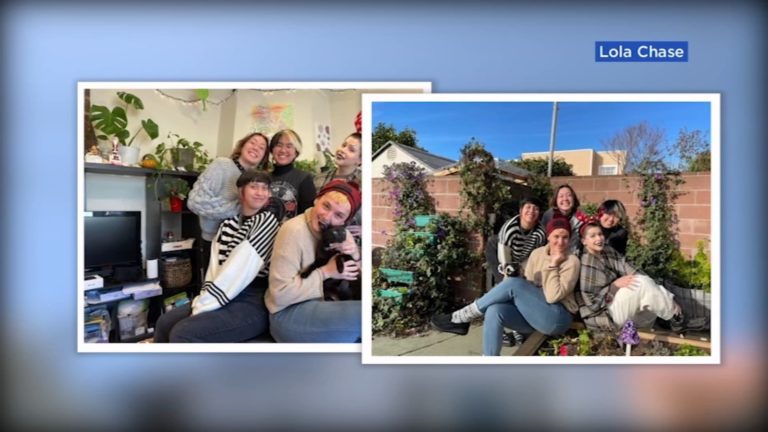

It’s tough to tell behind their big smile, but the last year and a half-packed tough times for 23-year-old Lola Chase, who uses they/them pronouns.
“I didn’t have the option to move back in with my parents. They aren’t accepting of me and my queer sense of self, my gender identity,” said Chase.
Despite the isolation, they weren’t alone. Several of their queer friends also faced housing insecurity last summer and couldn’t depend on family.
RELATED: LGBTQ homeless youth in San Francisco have a place to call home for the holidays
Five of them pooled their resources and found a house that’s now home.
“I would say this is a pandemic success story,” said Chase. “This trying time transmuted into something pretty amazing for us. It was that safe space we had all been yearning for.”
During the pandemic, the crew replaced in-person open mic nights with group gardening and weekly family-style dinners.
For others, finding a community has been more difficult.
“I’m still lacking in that queer group connection that I was really craving,” said an ABC7 Next Gen Youth Advisory Council member who asked not to be identified.
The 23-year-old Marin County resident attempted to join a group for young people who identify as lesbian through the Spahr Center, which serves the LGBTQ+ community.
RELATED: 25-year-old Alex Lee is California’s youngest, 1st openly bisexual state legislator
“There weren’t enough people interested in joining like a small support group where we can meet once a week. It just never ended up happening,” she said.
“It came as a surprise to us, but our youth are not really joining up with activities by Zoom. They’re just overdosed on technology,” said Dana Van Gorder, Spahr Center’s executive director.
The Center put an identity-specific support group for young lesbians on hold until more people are interested in joining or the Center can resume in-person meetings as COVID-related restrictions are lifted.
Van Gorder said there were also challenges in continuing groups for LGBTQ seniors online.
The Center provided computers to some and got others connected to the Internet.
“A primary part of our goal is to reduce isolation and build a sense of community,” Van Gorder said.
He also said COVID and the inability to gather in person have definitely affected the sense of connection in the queer community.
RELATED: LGBTQ Pride Movie Nights to be held in June at San Francisco’s Oracle Park
In the East Bay, Oakland’s LGBTQ Center has seen an increase in need.
“Folks didn’t have a place so it’s increased more than 100 percent — folks reaching out to gain support,” said Lania Watkins, wellness services director at the Oakland LGBTQ Center.
The Center has helped 600 families with emergency rent assistance.
It’s also seen an uptick in need across the board. The Center helps with primary care and reproductive health services offered through the newly-opened Glenn Burke Wellness Clinic and food pantry assistance. It also hosts identity-specific monthly discussion groups, like “Black Connect” for gay, bisexual, transgender, and queer men.
“The pandemic exacerbated the need for mental health services for the LGBTQ community. During this time, we just noticed people really actively reaching out,” said Watkins.
RELATED: Billy Porter on HIV Stigma and the Impact on the LGBTQ+ Community
Many people, like our Next Gen Youth Advisory Council member, are reaching out and searching for a sense of belonging.
“I’m really excited that people will read this and maybe start like these groups so I feel like I’m not the only person,” she said.
Chase is happy to have created a community of chosen family. They and their five roommates have matching “Chosen Family” tattoos to prove it.
“Chosen family is so important in the queer community. People may have parents who are unaccepting, so they can just have their own family that actually respects them and loves them,” said Amanda Leavitt, Chase’s roommate.
“Find your people,” said Chase. “That’s been the most uplifting thing for me is finding people I can be myself around. That’s when you get to amplify your life. You go from just surviving to thriving.”
For a list of community resources to help you find an ally, click here.
To learn more about the Next Gen Advisory Council (for ages 18-24), click here.
Copyright © 2021 KGO-TV. All Rights Reserved.